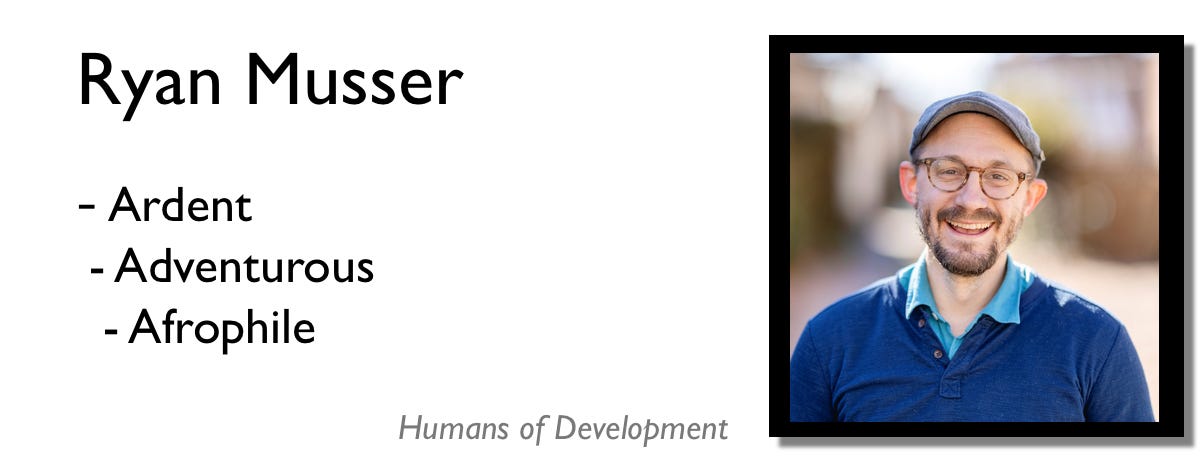Introducing Humans of Development: Ryan Musser
Showcasing the real people and measurable impact in foreign assistance programming
What is one misconception your friends have about your work?
I am Ryan Musser. A friend from high school once saw my work travel photos on Facebook and became convinced I worked for the CIA.
Coincidentally, after a work trip, I vacationed in Ethiopia and met a group of Australian diplomats who were also suspicious—certain I was spying on them because we had the exact same itinerary: four cities on the same days, plus a three-day mountain trek at the same time!
Your work spans from tactical to strategic. What’s one project that still gives you goosebumps?
My first project after college was supporting the Sudanese electoral commission in implementing the South Sudan referendum for independence. What an amazing part of history!
As a souvenir, my Chief of Party gave me a stack of cast ballots—each marked with the fingerprints of South Sudanese voters choosing between unity and independence.
You’ve helped strengthen African business associations. What is one insight needed by business leaders?
Don’t underestimate the power of collective action. Reform and change are difficult, but power lies in numbers and coordinated advocacy. The most successful business associations I’ve worked with move beyond just serving members individually; instead, they organize their members and build coalitions to advocate for systemic reform.
For example, in the lead-up to the 2018 elections in Zimbabwe, I partnered with the Zimbabwe Chamber of Informal Economy Associations to host nationwide town halls that brought informal workers into direct dialogue with local officials and political candidates, building political awareness and encouraging issue-based civic participation.
That effort laid the groundwork for the next stage: helping five associations—representing vendors, cross-border traders, and women entrepreneurs—form a coalition, develop a unified policy agenda, and engage Parliament, the Executive branch, and local governments.
This collective advocacy led directly to the government’s adoption of a National Formalization Strategy and reforms of outdated municipal bylaws that had criminalized informal traders. These policy wins were only possible because informal economy actors came together, formed a strong coalition, and spoke with one voice.
If you had to pick one everyday object to explain economic progress, what would it be and why?
It might sound cliché to say the mobile phone—but in the context of Africa, it’s arguably the most powerful symbol of economic reform.
Kenya is a prime example. In the early 2000s, Kenya doubled down on economic recovery by prioritizing private sector-led innovation. The 2006 National Payment System Act enabled non-bank entities, like telecoms, to offer financial services.
The Central Bank of Kenya took a progressive approach, allowing Safaricom to pilot M-Pesa under provisional guidelines—what we now call a regulatory sandbox—without needing a full banking license. This mitigated risk while enabling rapid scale.
The result? A financial services revolution and one of the most successful financial inclusion stories in the world.
Between 2006 and 2016, Kenya’s banked population skyrocketed from 27% to 96%. By 2020, mobile phone penetration among adults had reached 98%, fundamentally reshaping communities. Financial inclusion empowered individuals—especially rural women—to save securely, access credit, and transact without traditional banks.
Mobile phones also reduced information gaps, enabling entrepreneurs, traders, and farmers to access market data, coordinate logistics, and improve productivity. Tools like DigiFarm and M-Farm help farmers boost yields and expand reach.
In Kenya, the mobile phone touches nearly every facet of life. And it all traces back to bold economic reforms that unlocked innovation and allowed the private sector to thrive.
What’s the most memorable thing that’s ever happened to you in transit?
I once got stuck in traffic on the way to the Nairobi airport to fly to Kampala. I was going to miss my flight, so I decided to ditch the car. I told the driver to take my suitcase back to my boss, who was traveling the next day.
I hopped on a boda boda (motorcycle taxi) with nothing but a giant rolled-up banner for our organization in my arms. We weaved through traffic at breakneck speed, and I made it to the airport just in time. In hindsight, it was probably one of the dumbest decisions I’ve ever made—but definitely one of the most memorable.
Please contact Sulakshana Gupta if you’re a paid Career Pivot subscriber who would like to be profiled in a future Humans of Development post on Career Pivot and LinkedIn.






